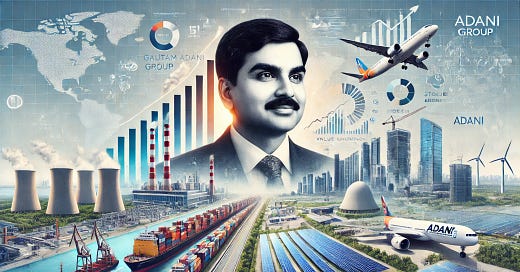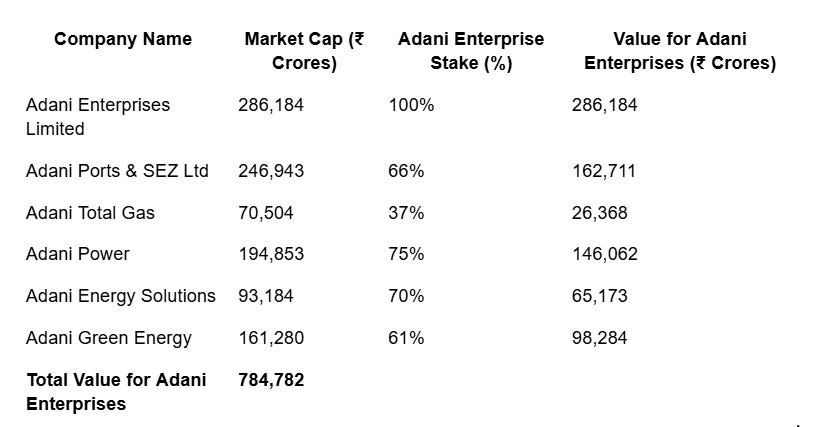Art of Value Creation: Part 1: Adani Group
This article is part of a series where we explore the value creation strategies of various promoters in the listed space.
Brief Overview
Adani Group, one of India's most dynamic and rapidly growing conglomerates, has redefined entrepreneurship with its bold vision and strategic diversification. From its humble beginnings in commodity trading in 1988, under the leadership of Gautam Adani, the Group has expanded into key sectors including ports, power, renewable energy, and infrastructure. What makes the Adani story particularly fascinating is its approach to growth: after successfully establishing each business, the Group has strategically spun off segments into independent entities, allowing them to scale and innovate on their own. This article delves into the remarkable journey of Adani Group, exploring how it unlocked immense value and revolutionized multiple industries, while examining the entrepreneurial ingenuity that has driven its success. Prepare to discover how one man’s vision transformed a single company into a global powerhouse.
Timeline of Adani Group
1988: Foundation and Commodity Trading
Adani Group began its journey in 1988 with the focus on commodity trading.
1994: Listing on Stock Exchanges
Adani Enterprises went public with an Initial Public Offering (IPO) of 1,261,900 shares of Rs 10 par value, listing on Indian stock exchanges. This marked the beginning of Adani Group’s public presence.
1995: Mundra Port Development
The company initiated the development of Mundra Port, which would later become India’s largest private port in terms of cargo handling.
1999: Foray into FMCG
Adani entered the FMCG sector through a joint venture with Wilmar International of Singapore, launching Adani Wilmar, which went on to become a key player in the Indian edible oil market.
2001: City Gas Distribution (CGD)
The Group expanded into the city gas distribution business, marking a significant milestone in India’s energy sector.
2005: Mine Development and Operation Contract
Adani was awarded India’s first Mine Development & Operation (MDO) contract for Parsa East and Kanta Basan coal blocks.
2007: IPO of Adani Ports and SEZ
Adani Ports and Special Economic Zone (APSEZ) launched its own IPO, raising significant capital for expanding port operations.
2008: Acquisition of Bunyu Mine, Indonesia
Adani acquired the Bunyu Coal Mine in Indonesia, adding to its global footprint in the mining sector.
2009: Launch of Adani Power IPO
The IPO for Adani Power was launched, helping the company expand its power generation capacity.
2010: Acquisition of Carmichael Mine, Australia
Adani Group acquired the Carmichael coal mine in Australia, which would become a key asset in the company’s energy portfolio.
2015: Demerger of APSEZ, APL, and ATL
The company reorganized its structure by demerging Adani Ports, Adani Power, and Adani Transmission into separate entities.
2017: Adani Solar PV Panel Manufacturing
The Group entered the solar energy market, beginning the manufacturing of Solar PV panels as part of its green energy initiatives.
2018: Demerger of Adani Green Energy and Adani Gas
Adani Green Energy and Adani Gas were demerged, allowing the Group to focus on renewable energy and gas distribution separately.
2020: Entry into the Airports Sector
Adani Group forayed into airport operations, acquiring a portfolio of six airports across India.
2022: Acquisition of Mumbai and Navi Mumbai Airports
The Group continued expanding in the airport sector, acquiring stakes in Mumbai and Navi Mumbai airports, solidifying its leadership in India’s airport infrastructure.
2023: Acquisition of 23.5% Stake in Mumbai Airport
Adani Group acquired a further stake in Mumbai International Airport, further expanding its footprint in the aviation sector.
Potential Value Created by Adani Group
Early Growth and Value Creation
Adani Enterprises was founded in 1988 and went public in 1994, raising funds to fuel its expansion into new sectors. The listing facilitated capital raising for key infrastructure projects, including the development of Mundra Port, which would later become a significant revenue generator.
Mundra Port:
The first ship docked in 1998, and commercial operations began in 2001. By 2014, Mundra Port had become India’s largest private port, surpassing Kandla Port in cargo handling.
Diversification into FMCG & Other Key Sectors
Adani Group’s diversification into the FMCG sector through its joint venture with Wilmar in 1999 proved successful. The Adani Wilmar brand “Fortune” became the top-selling edible oil brand in India, and by 2022, the company had gone public, raising ₹3,600 crore, with promoters retaining a 44% stake.
City Gas Distribution (CGD):
The Group made significant strides in the city gas distribution sector, commissioning plants in Vadodara and Ahmedabad, and expanding into multiple new areas under both its own name and joint ventures. By 2018, Adani Gas was rebranded as Adani Total Gas Limited (ATGL) after Total acquired a stake in the company.
Mining Operations:
Adani Group ventured into coal mining with the award of India’s first MDO contract in 2005. Acquisitions of international mines like the Bunyu Mine (Indonesia) in 2008 and the Carmichael Mine (Australia) in 2010 gave the Group a global presence in the mining sector, though the latter faced regulatory and environmental challenges.
Power Sector Expansion
Adani’s entry into the power sector began in 2006, with the financing of Mundra Phase I Power Project. Over time, the company expanded its capacity through successful projects like Tiroda Power, which became India’s largest private power producer with a total capacity of 3,300 MW.
Adani Power IPO:
The company launched an IPO in 2009, raising ₹2,500 crore for its power generation projects.
Airport Infrastructure
In 2020, Adani Group ventured into the airport sector, acquiring six airports from the Airport Authority of India for ₹2,440 crore. With the addition of Mumbai and Navi Mumbai airports in 2022, Adani Group became India's largest airport infrastructure player.
Value Creation Across the Group
Below is a snapshot of key companies within the Adani Group and their market valuations, as well as the stake held by Adani Enterprises:
Concluding Thoughts
The entrepreneurial acumen of Gautam Adani has been truly commendable. What began with a single venture in commodity trading under Adani Enterprises in 1988 has since transformed into a vast and diversified conglomerate. Adani's strategic vision allowed the Group to successfully expand into multiple sectors, from ports and power to gas distribution and FMCG.
As each segment matured and became more self-sustaining, Gautam Adani's leadership further unlocked value by demerging these businesses, allowing them to grow independently. This approach not only fostered innovation within the Group but also provided a clear focus for each business unit, empowering them to reach their full potential.
Adani’s ability to identify growth opportunities, nurture them, and then scale them independently demonstrates his exceptional entrepreneurship skills. This strategy has created immense value for shareholders and positioned the Adani Group as a leader across several critical sectors. Moving forward, the Group's continued evolution, particularly in green energy and infrastructure, holds promising prospects for even greater value creation.





